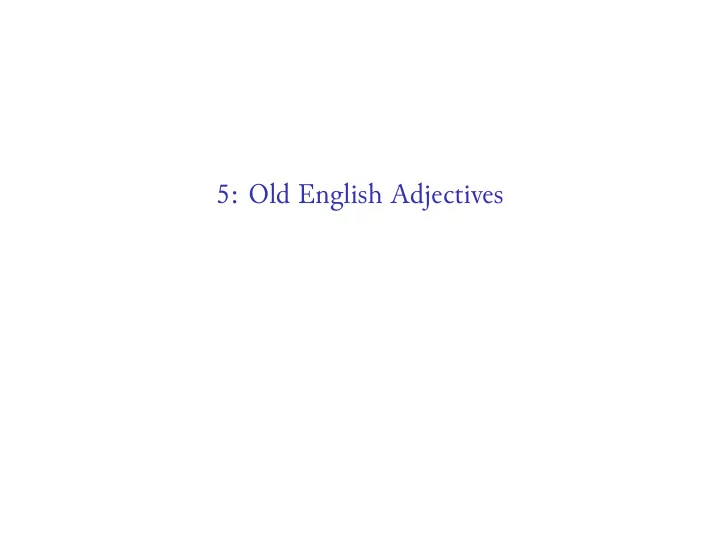

5: Old English Adjectives
Sightreading Ælc Cristen man sceal cunnan his paternoster and his credan. Ic mæg mid handum swa fela wundra gewyrcean. Ic eom Godes cempa, ne mot ic na feohtan. Heo cuðe Godes æ. Oft ic þe bæd þæt ic moste to þe faran. Hit ne mihte eall mancyn gedon gif he sylf nolde. Þæt witon boceras, þe þæt leden cunnon, þæt we na ne leogað.
Adjectives: Strong Versus Weak When declined weak, adjectives have many forms that end in -an . (The same goes for weak nouns.) Masc. Sg. Plural Nom. gōda gōdan Acc. gōdan gōdan Gen. gōdan gōdra Dat. gōdan gōdum Accordingly, they are less helpful in identifying case and number. Look to the first modifier and/or the noun instead. ▶ þām gōdan cyninge
German Adjectives German adjectives come in three declensions, which are really permutations of strong and weak, plus one uninflected form: ▶ Uninflected : in predicative (i.e. post-head) position and unconnected speech ▶ Der König ist gut ▶ Gut! ▶ Strong : beginning the noun phrase; following an indication of quantity ▶ Guter König! ▶ Gute Menschen sind selten. ▶ Ein bisschen guter Wille ▶ Mixed : following the indefinite article or a possessive adjective ▶ Ein guter König ▶ Mein guter König ▶ Meine guten Könige ▶ Weak : following other modifiers (notably articles) ▶ Der gute König
Old English Adjectives Old English adjectives come in uninflected, strong, and weak, but with a different distribution: ▶ Uninflected : headless/unconnected speech ▶ Gōd! ▶ Strong : beginning the noun phrase; in predicative position ▶ Gōde cyningas ▶ Þā cyningas sindon gōde ▶ Weak : following any prior modifiers; in address ▶ se gōda cyning ▶ Mīnes fæder gōda cyning ▶ Eala gōda cyning!
German Versus Old English Adjectives Syntactic Context German e.g. Old English e.g. Unconnected/headless Uninflected gut Uninflected gōd Predicative Uninflected gut Strong gōd Preceded by indefinite Strong guter Weak gōda Preceded by possessive Mixed gute(r) Weak gōda Preceded by genitive Mixed gute(r) Weak gōda construction Preceded by anything Weak gute Weak gōda else First word in phrase Strong guter Strong gōd Address Strong guter Weak gōda
Old English: Strong Adjective Declension Gōde cyningas First word in phrase Þā cyningas sindon gōde Predicative position Gōd! Unconnected Hwæt is gōd? Predicative position Hwæt is gōd willa būtan gōdnys? First word in phrase (Red indicates differences from German usage.)
Old English: Weak Adjective Declension Se gōda cyning Preceded by demonstrative Ān gōda cyning Preceded by indefinite Mīn gōda cyning Preceded by possessive Þāra Seaxna gōda cyning Preceded by genitive construction La gōda cyning! Address (Red indicates differences from German usage.)
Old English Adjectives: Strong and Weak Always strong: ▶ Possessive adjectives ( mīn , his , ēower ): Gyt ne cōm mīn tīd; ēower tīd is symble gearu. ▶ Ōþer (“second, other”): Ic gehyre mīnne ōþerne hlāford. Always weak: ▶ Comparatives: Hige sceal þē heardra ▶ Ordinal numerals other than ōþer : Mǣg wæs his āgen þridda and hē feōrða sylf.
Adjectives: Strong and Weak Strong Masc. Neut. Fem. Plural Masc. Neut. Fem. Nom. til til tilu Nom. tile tilu tile Acc. tilne til tile Acc. tile tilu tile Gen. tiles tiles tilre Gen. tilra tilra tilra Dat. tilum tilum tilre Dat. tilum tilum tilum Weak Masc. Neut. Fem. Plural Nom. tila tile tile tilan Acc. tilan tile tilan tilan Gen. tilan tilan tilan tilra Dat. tilan tilan tilan tilum
Comparison ▶ Comparative adjectives always decline weak; ▶ Superlatives decline according to context. Positive Comparative Superlative blind blindra blindost hwæt hwætra hwatost hālig hāligra hālgost eald ieldra ieldest geong gingra gingest hēah hīerra hīehst lang lengra lengest sceort scyrtra scyrtest
Comparison Irregulars: Positive Comparative Superlative gōd betra betst gōd sēlra sēlest yfel wiersa wierst micel māra mǣst lȳtel lǣssa lǣst
Recommend
More recommend